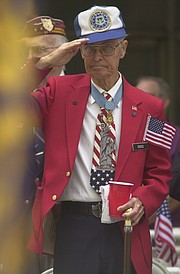Even as Medal of Honor recipient Desmond Doss sat in his small frame house in the Rising Fawn community of Lookout Mountain in 2003, he envisioned a day in which a feature film based on his life might be an inspiration to others.
On Friday that film, "Hacksaw Ridge," the story of his courageous service during World War II as a conscientious objector, will open in theaters across the country.
"I know my days are numbered," he told this writer while seated on the couch in his rural home. "If there is an opportunity to help and be a blessing to others, I want to do the best I can."
Doss, who died in 2006, had only three years before the interview given his permission for a documentary film, "The Conscientious Objector," to be made on his service.
Before that, according to his second wife, Frances, he hadn't wanted to sell the story "lock, stock and barrel" because he was afraid filmmakers wouldn't emphasize the importance of his Seventh-day Adventist faith and his reliance on the Ten Commandments as his guide.
If the Adventist Review, which would be preternaturally critical about the treatment of its faith, is any guide, the Mel Gibson-produced film fulfills Doss' wishes.
"Unlike the treatment Christianity so often receives at the hands of Hollywood movie makers, 'Hacksaw Ridge' neither downplays Desmond Doss' Christian faith nor minimizes or ridicules his beliefs," the church publication said. "Instead, the movie very carefully, respectfully, and accurately portrays Doss' faith in God. Doss is presented neither as a fanatic nor as a member of the lunatic fringe. Corporal Doss - a private first class at the time of the Battle of Okinawa - is presented as a balanced, Sabbath-keeping, vegetarian, Bible-believing Christian who was moved by faith in God to adhere to his biblical beliefs in the face of overwhelming opposition. [It] is an inspirational story of a Christian's unwavering faith in God."
Doss, for those unfamiliar with his story, refused to pick up a gun, work on Saturday and insisted he be able to attend worship services when possible, but nevertheless served as a medic during the final months of war in the Pacific theater. He received his Medal of Honor for actions from April 29 through May 21, 1945, near Urasoe-Mura on the Ryukyu Islands of Okinawa, Japan.
He was commended for, among other things, refusing to seek cover in a heavily fired-upon jagged escarpment. Instead, he moved wounded soldiers one by one to the edge of the escarpment and lowered them down the cliff face to further aid.
Among the men Doss moved to safety were fellow soldiers who had ridiculed him for his strong religious beliefs and his refusal to fire a gun. His Medal of Honor citation states he removed 75 men from the escarpment during one day of fire, a number he said in 2003 was a compromise between his superior officers' theory of 100 and his own thought of 50.
"It's not the number," he said. "It's the satisfaction of knowing you have been able to save the lives of some of your buddies."
Doss, who was later wounded three times and left the Army 90 percent disabled, said he was no hero - just someone doing his job.
"On that escarpment, there were men with wives and families out there," he said. "I thought, 'I can't leave them out there.' How could you? I just had a job to do, and you do the best you can."
The producer of "The Conscientious Objector," former Chattanoogan Terry Benedict, is listed as a producer on the new film. In 2003, even after working with the Medal of Honor winner for three years, he was still awed.
"His story is so unbelievably fantastic," he said, "it's like a legend while he's still alive. Once he's gone, it'll be unbelievable - like a big fish story."
Even actor Andrew Garfield, the "Spiderman" star who portrays Doss in the new film, was inspired.
"He's an incredible model of what it is to love and treat everyone equally," he told Variety last week. "I tried to absorb as much of his essence as possible. I was able to go to his hometown and handle his old tools in sort of a mystical thing where you hope to absorb his essence."
Contrast Doss' escapades of 71 years ago with the cowardice of handgun-wielding gang members today firing into a crowd of people because one in the crowd was thought to have disrespected someone else. Contrast it with the temerity of college students who need "safe spaces" to flee to in order not to hear the opinion of someone whose thoughts differ from theirs.
Though we are likely never to be called upon to perform feats similar to the Virginia native, who is buried in the Chattanooga National Cemetery, we can be heroes in the eyes of others by playing with our children, giving time to a cause greater than ourselves, putting in an honest day's work for an honest day's pay and building up lives instead of tearing them down.
In that, we would be like Doss, who referred to himself more accurately as a conscientious cooperator.
